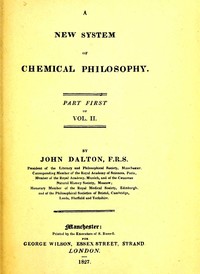A new system of chemical philosophy, Volume 2, Part 1 by John Dalton
"A New System of Chemical Philosophy, Volume 2, Part 1" by John Dalton is a scientific publication written in the early 19th century. This work marks Dalton's significant contribution to the field of chemistry, where he explores the nature of chemical compounds, particularly focusing on metallic oxides and the relationship between metals and oxygen. The text embodies foundational hypotheses in atomic theory and chemical reaction principles that emerged during this formative period
in scientific inquiry. The opening of this volume begins with a preface that outlines the lengthy process of its publication, starting from 1817 to its completion in 1827. Dalton discusses his methods for investigating compounds such as oxides, detailing specific experiments and techniques for determining the proportions of elements within these compounds. He emphasizes the challenges faced in accurately identifying the weights and relationships of metals and oxygen, employing a methodical approach to provide a clearer understanding of chemical interactions. Dalton's meticulous reporting of experiments reflects a dedication to empirical observation, making this work a crucial reference for scholars seeking to comprehend early chemical principles and atomic structure. (This is an automatically generated summary.)
Read or download for free
| How to read | Url | Size | |||
|---|---|---|---|---|---|
| Read now! | https://www.gutenberg.org/ebooks/74948.html.images | 567 kB | |||
| EPUB3 (E-readers incl. Send-to-Kindle) | https://www.gutenberg.org/ebooks/74948.epub3.images | 435 kB | |||
| EPUB (older E-readers) | https://www.gutenberg.org/ebooks/74948.epub.images | 434 kB | |||
| EPUB (no images, older E-readers) | https://www.gutenberg.org/ebooks/74948.epub.noimages | 324 kB | |||
| Kindle | https://www.gutenberg.org/ebooks/74948.kf8.images | 738 kB | |||
| older Kindles | https://www.gutenberg.org/ebooks/74948.kindle.images | 701 kB | |||
| Plain Text UTF-8 | https://www.gutenberg.org/ebooks/74948.txt.utf-8 | 466 kB | |||
| Download HTML (zip) | https://www.gutenberg.org/cache/epub/74948/pg74948-h.zip | 398 kB | |||
| There may be more files related to this item. | |||||
Similar Books
About this eBook
| Author | Dalton, John, 1766-1844 |
|---|---|
| Title | A new system of chemical philosophy, Volume 2, Part 1 |
| Original Publication | Manchester: Executors of S. Russell for George Wilson, 1827. |
| Credits | Aaron Adrignola and the Online Distributed Proofreading Team at www.pgdp.net (This file was produced from images generously made available by The Internet Archive) |
| Reading Level | Reading ease score: 59.3 (10th to 12th grade). Somewhat difficult to read. |
| Language | English |
| LoC Class | QD: Science: Chemistry |
| Subject | Atomic theory |
| Subject | Chemistry, Inorganic |
| Category | Text |
| EBook-No. | 74948 |
| Release Date | Dec 20, 2024 |
| Copyright Status | Public domain in the USA. |
| Downloads | 268 downloads in the last 30 days. |
| Project Gutenberg eBooks are always free! | |

